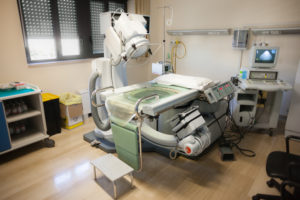Lithotripsy procedure
Lithotripsy for kidney stones is a common procedure used by urologists to break down large stones, or stones that are lodged. This procedure uses a lithotripter machine that produces shock waves in order to break up stones into smaller fragments. Once fragmented, the stones can pass out of the body. This minimally invasive procedure is also referred to as Shock Wave Lithotripsy or Extracorporeal Shock Wave Lithotripsy (ESWL).
Lithotripsy for kidney stones
Millions of men, women, and children develop kidney stones each year. Oftentimes, when stones are small enough, they will easily pass out of the body unnoticed. The lithotripsy procedure is recommended for patients who have large stones that are lodged and unable to move out of the body on their own.
Although it is a minimally invasive procedure, lithotripsy is performed in a hospital or surgical center under general anesthesia. During the procedure, the surgeon will send high frequency sound waves, through the body, to the location of the kidney stone(s). These shock waves will break up the stones into a small, grainy substance.
At the end of the procedure, the urologist will place a tube, known as a JJ stent, into the ureter. This stent will allow the bladder to expel the fragmented material out of the body during urination. The urologist will remove the JJ stent once the kidney stone fragments have completely left the body. In general, a lithotripsy lasts a minimum of 45 minutes.
What to expect after lithotripsy for kidney stones
As with any medical procedure, there can be risks and aftereffects. Some of these can include:
- Frequent urination.
- Pain or discomfort as stone fragments pass.
- Additional treatment if stones aren’t broken down enough to pass.
- Infection if stones become lodged.
- Blood in the urine.
- Tissue damage from shock waves.
Lithotripsy patients should contact their urologist if they experience persistent or severe symptoms following their procedure.
If you have a history of kidney stones, contact Urology Austin to schedule an appointment.

